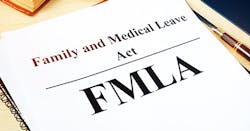If you are an employer, allow me to present you with an early Christmas gift courtesy of a little-known provision of the 2017 tax reform law. The catch is, in order to qualify for it this year you have to act before Dec. 31.
The boon consists of a tax credit for qualifying types of paid leave provided to full- and part-time employees. It is available to any employer, regardless of size, if you provide at least two weeks of paid family and medical leave annually for employees who have been with the company for at least 12 months. The paid leave must amount to at least 50% of the wages normally paid to the employee whose prior year compensation was at or below $72,000 for 2018.
The credit is equal to 12.5% of wages paid to an employee while on leave for up to 12 weeks in a tax year for a purpose that is protected by the Family and Medical Leave Act (FMLA) and receiving 50% of what IRS calls “normal wages,” which it defines as not including overtime or bonuses.
The credit increases by 0.25% for each percentage point by which the rate of paid leave exceeds 50% of normal wages, up to a maximum credit of 25% where a qualifying employee receives 100% of his or her normal pay while on leave.
“Where an employer provides paid leave for both FMLA purposes and other purposes (such as vacation or personal leave), the written policy must designate the leave provided for FMLA purposes in order to qualify for the credit for such leave,” note attorneys Anne G. Batter and Sinead M. Kelly of the law firm of Baker McKenzie.
For example, a paid maternity or paternity leave policy that provides additional paid leave (over and above vacation, sick leave or other paid time off) would likely qualify, they say.
Get it in Writing
Employers who already provide paid leave for an FMLA purpose should amend their written policies to meet the notice requirements by Dec. 31, which is required if they wish to claim the credit for any qualifying leave granted employees since Jan. 1, 2018 (as well as for 2019).
Any employer will be eligible for the credit if it has a written policy in place that provides paid family and medical leave, satisfies the minimum paid leave requirements, and, if applicable, includes certain required “non-interference” language.
The employer must include this “non-interference” language in its written policy if at least one qualifying employee is not covered by the FMLA. The non-interference language states that the employer will not interfere with, restrain or deny exercise of any right provided under the paid leave policy, and will not discharge or discriminate against any individual for opposing practices prohibited by the policy.
Not complicated enough for you? According to the IRS notice, paid leave required by state or local law is not counted in determining whether an employer provides a rate of payment of at least 50% of an employee’s normal wages. In California, New Jersey, New York and Rhode Island, employers must provide 50% of normal wages on top of any state-funded amount to qualify for the credit.
Did you get all of that? You may be asking why you haven’t heard of this before. The IRS did not get around to issuing the notice spelling all of this out until Sept. 24, and the deadline for accepting public comments on regulations was set for Nov. 23.
Until the proposed regulations are issued, employers considering implementing a paid leave policy should familiarize themselves with this tax credit and analyze how the credit might impact their decision,” says attorney Arslan Sheikh of the law firm of Porter Wright Morris & Arthur.
“Because the tax credit is available only for wages paid in 2018 and 2019, employers should consult their attorneys and/or financial advisors to determine whether instituting a paid leave policy merely to claim this credit is worth the cost,” Sheikh suggests.
About the Author
David Sparkman
founding editor
David Sparkman is founding editor of ACWI Advance, the newsletter of the American Chain of Warehouses Inc., as well as a member of the Editorial Advisory Board of Material Handling & Logistics, a sister publication to IndustryWeek.
